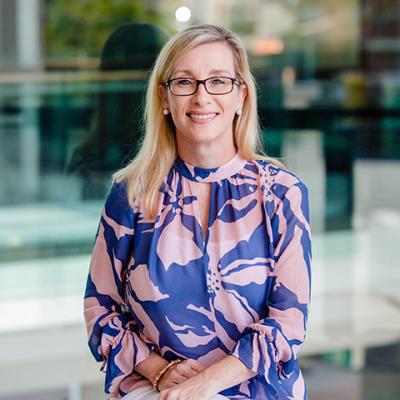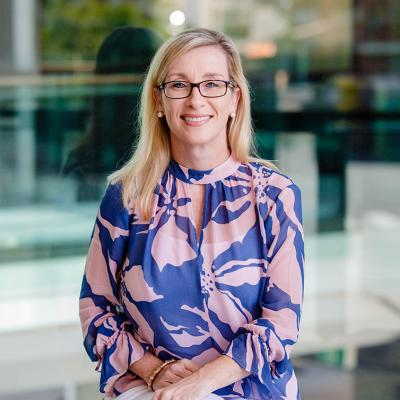Are you looking for a career you feel passionate about while making an impactful difference in people’s lives?
Communication is at the forefront of everything we do. The ability to be heard and feel understood is essential to human connection and overall wellbeing. However, not everyone experiences this luxury naturally, which is why speech pathologists are so important and in high demand. They help individuals overcome communication challenges and connect with the people and world around them.
If you feel drawn to change individuals' lives positively, the Master of Speech Pathology Studies at UQ could be the next step for you, and here are our top 6 reasons to study this program.
1. Growing demand for speech pathologists in Australia
With growing demand for healthcare services in Australia, an aging population, and increased awareness of speech and language disorders, the need for speech pathologists has never been higher. According to Global Health Education, job opportunities are expected to grow by 34.7% by 2026. Additionally, Jobs and Skills Australia reports a significant shortage of speech pathologists nationwide, ensuring job security, career growth, and continuous opportunities for learning and development.
“Availability of speech pathology services is not meeting the level of need and demand in Australia. This means that not all people who need speech pathology services can access them”.
- Speech Pathology Australia Workforce Analysis Report 2023
One of the top benefits of studying speech pathology at UQ is that you’ll graduate with a competitive skillset highly sought after by employers.
Senior Lecturer in Speech Pathology Brooke-Mai Whelan is confident that UQ’s speech pathology students will be in good stead for their careers in a job market calling out for their expertise.
In the growing field of speech pathology, you’ll graduate with the skills necessary to meet this demand.
2. Learn from leading experts
Work alongside experienced professionals to positively impact the lives of individuals facing communication challenges. Our teaching staff consists of leading speech pathology researchers at the top of the field. You’ll learn from the best, with the most up-to-date knowledge, techniques, and advancements in the field. This will not only enhance your learning experience, but you can rest easy knowing you’ll graduate with the knowledge, skills, and attributes necessary to deliver individualised, culturally responsive, evidence-based intervention and support to transition into the field seamlessly.
Speech pathology student Claudia Aw reflects on her experience learning from UQ's teaching staff and guest lecturers.
“We regularly have guest lecturers who bring their expertise into our classrooms," she says.
"Our dysphagia lectures were taught by Professor Elizabeth Ward and Dr. Jeanne Marshall, both highly regarded internationally as clinicians and researchers."
"It felt surreal to be learning from experts whose research I had previously studied and whose presentations I had seen at events like the Speech Pathology Australia conference. Having them teach us reinforced my confidence in the high standard of education that UQ provides to its students and inspired me to strive for excellence.”
The Master of Speech Pathology Studies program ensures you don’t just learn from textbooks but gain practical skills and experiences from the experts, preparing you for real-world challenges.
3. Graduate career ready
Our renowned and nationally leading simulation program offers a unique opportunity to develop and refine your clinical skills in a safe, supportive, structured, and immersive environment. Through realistic simulations, you’ll practise various scenarios you’d likely encounter in the workplace. This hands-on approach ensures you are prepared to handle diverse patient needs, strengthening problem-solving and critical thinking skills. Without the added pressure of “real” patients, you can make mistakes and receive feedback in a safe environment. By building a strong foundation for success, you'll gain the confidence needed to transition seamlessly into real-world clinical placements across a variety of settings, including hospitals, educational facilities, and UQ’s own Speech Pathology Clinic. As a graduate, you’ll be equipped to work with a diverse range of clients, ensuring you are career ready.
Claudia shares how beneficial it’s been to put theory into practice during her clinical placements.
“Placement provides us exposure to learning and applying knowledge and skills across various settings," she says.
"Depending on the placement location, you get to work with diverse clients, which helps you gain a better understanding of where your passions and interests lie after graduation.”
4. Experience the reward of transforming lives
One of the most rewarding aspects of speech pathology is the fulfilment that comes from improving the quality of life for patients, as well as their families and friends. Quality of life can be significantly affected when our ability to communicate is obstructed. Think of the small tasks you do daily that you wouldn’t even think twice about; many of these rely on communication.
Brooke-Mai tells us about her experience of helping a client go to the KFC drive-through for the first time in 10 years.
“She was thrilled that she could be understood by a stranger, and it’s outcomes like these that affirm what a positive contribution speech pathology can make to the lives of those with communication disabilities.”
Claudia shares how rewarding it’s been to form client bonds and witness their progress during clinical placements.
“Doing clinical placements and seeing in real time how I can apply the theory I've learnt at university has been the most fulfilling aspect," she says.
"Getting to see how to practise as a clinician and form a therapist-client bond, and seeing how your intervention helps the client improve and work towards their goal is very rewarding."
5. Embrace a diverse and dynamic career
Speech pathology is a rapidly evolving field that offers a wide range of opportunities, both in client demographics and types of work. You’ll engage with individuals of all ages – from newborns with feeding difficulties and children facing speech, language, and literacy challenges, to adults with acquired brain injuries and older adults in aged care. Your work will take place in various environments, including:
- schools
- hospitals
- private practices
- rehabilitation centres
- research institutions.
UQ’s Associate Professor Stephen Wilson emphasises how the program prepares students to effectively treat a diverse array of clients.
“Pursuing a Master of Speech Pathology Studies degree at UQ allows you to gain expertise in assessing and treating disorders related to speech, language, and swallowing, addressing critical needs in diverse populations and environments.”
UQ’s Master of Speech Pathology Studies will equip you with everything you need for a diverse, dynamic, and rewarding career as a speech pathologist. The program is an accelerated 2-year program for students who have already completed an undergraduate degree.
Entry requirements
To gain entry into the Master of Speech Pathology Studies, you’ll need a bachelor's degree (or equivalent) in any discipline.
Entry is based on GPA. Prior study in fields such as health, humanities, education, and social, physical or biological sciences is recommended but not required. Learn more about entry requirements for this program.
6. Integrated research and practice
Did you know UQ is home to a research centre called Queensland Aphasia Research Centre (QARC), Australia’s first clinically based centre dedicated to aphasia? QARC brings together clinicians and researchers, helping clinicians and students apply research findings in their practice. This provides a unique opportunity and access to collaboration, groundbreaking research, treatments, and innovative therapies. Our teaching staff are leading the way in training students to graduate with the communication skills they need to excel as clinicians. Through this connection, you will deepen your understanding of aphasia and enhance your practical skills, ultimately preparing you to deliver the highest level of care in your professional practice.
Claudia shares how the skills she gained through her research project with QARC built her confidence to succeed.
“I had the opportunity to take part in a research project headed by Associate Professor Sarah Wallace and Dr Michelle King, both of whom are experts in their fields of speech pathology and sociology respectively," she says.
"It was an eye-opening experience working closely with these experts as my mentors while drafting a research paper for publication with them. I learnt a lot about decision-making for people in aged care, what barriers I may face as a speech pathologist working in this setting, and what I could do to help better the welfare of the population. Their knowledge and passion for the aged care population have been very inspiring, giving me confidence that I am developing the skills necessary to succeed in my career as a speech pathologist.”
These hands-on, invaluable learning opportunities will set you up for success to contribute meaningfully to the lives of those affected by communication challenges.
Join the thriving industry of speech pathology and apply to study a Master of Speech Pathology Studies today.







